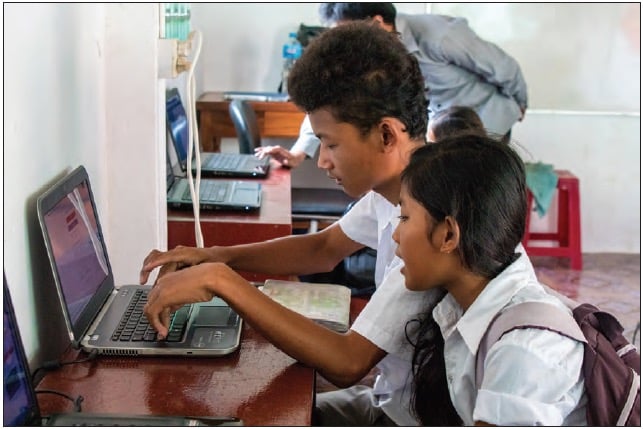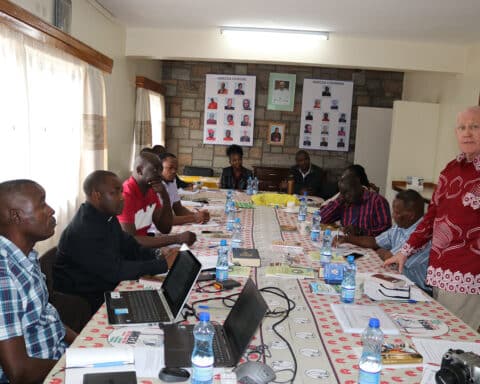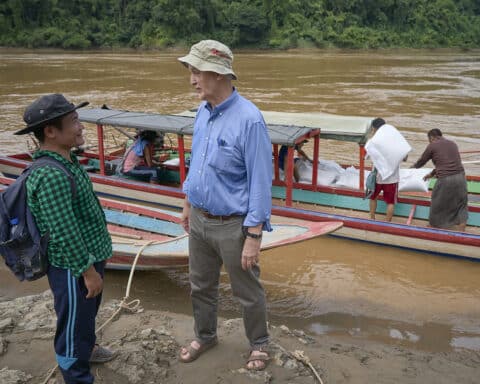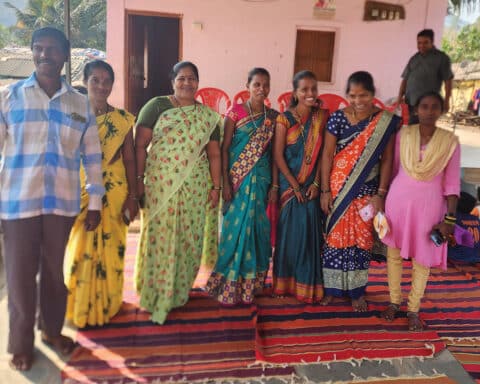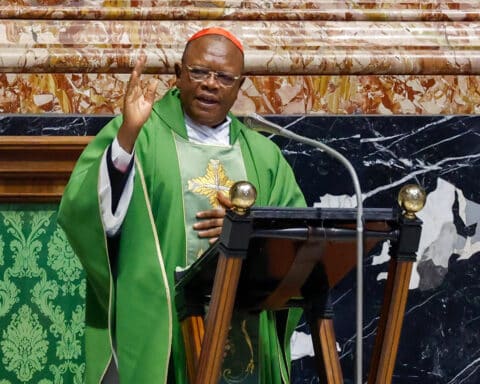At 69 years, John Tucker jokes that he should be enjoying retirement with his feet up on the couch and watching “Dr. Phil” on the tube.
“But I don’t want to do that,” said Tucker, who left a successful financial planning firm in his late 40s to be a missionary with his wife, Kathy.
Today, John and Kathy Tucker operate New Hope for Cambodian Children, a nonprofit that provides medical care, housing, education and vocational opportunities to about 260 children, teenagers and young adults who were orphaned because they have HIV/AIDS.
Seeing past the stigma
Tucker said he and Kathy decided to start their nonprofit after going to Cambodia as Maryknoll missionaries and witnessing firsthand how children there, who had contracted HIV through their mothers at birth, were often abandoned once their parents died.
“There was a lot of stigma and discrimination against them,” Tucker said. “The extended families might take children who were not infected and integrate them into an aunt or uncle’s family, but they wouldn’t do that with the HIV-infected kids.
“These kids had nowhere to go,” Tucker said.
Moved with compassion and seeing an urgent need, John and Kathy Tucker founded New Hope for Cambodian Children in 2006. Thousands of children have been given a new lease on life over the last 12 years by being treated with antiretroviral medications and given educational and employment opportunities.
“We’ve gotten hundreds of kids on the medicine, and those kids have now graduated from college,” Tucker said. “Once you’re on the medicine, AIDS is no longer a terminal disease. It’s a chronic disease. You just have to take the medicine everyday.”
No American dream
The nonprofit is not sectarian and takes in orphans regardless of religious background. But the Catholic faith is a driving force for the Tuckers.
“We’re committed Catholics, and everything we do is informed by the Faith,” said Tucker, who cited the Lord’s instructions in Matthew 25: “‘Amen, I say to you, whatever you did for one of the least of these brothers of mine, you did for me.'”
“If you believe the Gospel, then you’re supposed to do something with your life, not just make money,” Tucker said.
When he was in his 30s, working, raising a family, paying the mortgage and the bills, the idea never occurred to Tucker that he would one day give it all up to go overseas and live 11 months out of the year in Cambodia.
“I was raised with the American dream,” Tucker said. “Your paycheck is your worth, and that’s how society views you. It’s all about chasing the almighty dollar and getting rich. Then one day, you wake up and you realize it’s an empty promise and that it’s not what you want to do anymore.
“That’s what happened to me,” Tucker said. “I woke up and said I wanted to do something else with my life.”
Tucker said his wife Kathy had gone through RCIA during their marriage and became Catholic. They studied Scripture together and read about the life of Mother Teresa, whose life story moved them to want to “do something more” with their lives.
“We basically decided to give up the American dream,” said Tucker, who used to drive to work every day in a convertible.
The Tuckers, who had five adult children in college at the time, went to their parish priest and told him they wanted to give up everything and travel to Calcutta to work with Mother Teresa. The priest advised them to try a missionary trip to Mexico instead.
For three years, John and Kathy Tucker lived in Mexico as independent missionaries under the auspices of the Diocese of Austin in Texas, until being recruited to join Mary-knoll, the international Catholic mission movement.
A leap of faith
In 2000, with drug-related violence on the rise in Mexico, the Tuckers were assigned to Cambodia. There, they worked at a hospice for adults who were dying from AIDS because antiretroviral medicine was not available. Many of those adults were leaving children behind, some of whom were infected with HIV.
“We saw children who were dying due to a lack of medicine and abandoned because they had HIV,” said Tucker. They in turn opened a clinic to provide the HIV-infected children with the medicine they needed to keep the virus under control.
“We had no idea what we were going to do. We took a leap of faith, opened the clinic, got the kids on the medicine and now those kids have successful lives,” said Tucker, who raised money to acquire the medicine and open the clinic.
The program grew to become the largest pediatric HIV/AIDS treatment program in Southeast Asia, supplying more than 400 children with free antiretroviral medications. Seeing the need to further expand the program, the Tuckers went on to found New Hope for Cambodian Children.
The program consists of full-time holistic care for more than 200 orphans and abandoned children with HIV/AIDS in a residential facility located outside Phnom Penh. The nonprofit also supports 37 young people who attend university or vocational school by paying their tuition, housing, food, medical and transportation costs.
A changing epidemic
New Hope for Cambodian Children is not a Catholic or religiously affiliated charity, but the Tuckers’ example has moved a number of children and young adults from their program to convert. At the Easter Vigil this year, nine children entered the Catholic Church.
The youngest child in the program, who is about 2 years old, was brought to the site when he was around 3 months old. With medicine having become more available and other technological advancements in the last 20 years, Tucker said the program is seeing fewer infected children and orphans.
“The epidemic has changed,” he said. “Kids are not being infected at the rate they used to be. We used to get a new child every week. Now we’re getting a new child every three months. Hopefully in 10 years they won’t need us anymore.”
Until then, John and Kathy Tucker will spend their golden years fundraising and running the day-to-day operations of a major healthcare and educational nonprofit. They were recently visiting family in Texas, spending their month in the states seeing relatives and raising funds.
“We know God will come through with the donations and the money we need to support these children. We don’t panic about it,” Tucker said. “We do the work, the fundraising, the talks, and somehow, someway the money comes in and we’re able to take care of the kids.”
Brian Fraga write from Massachusetts.

